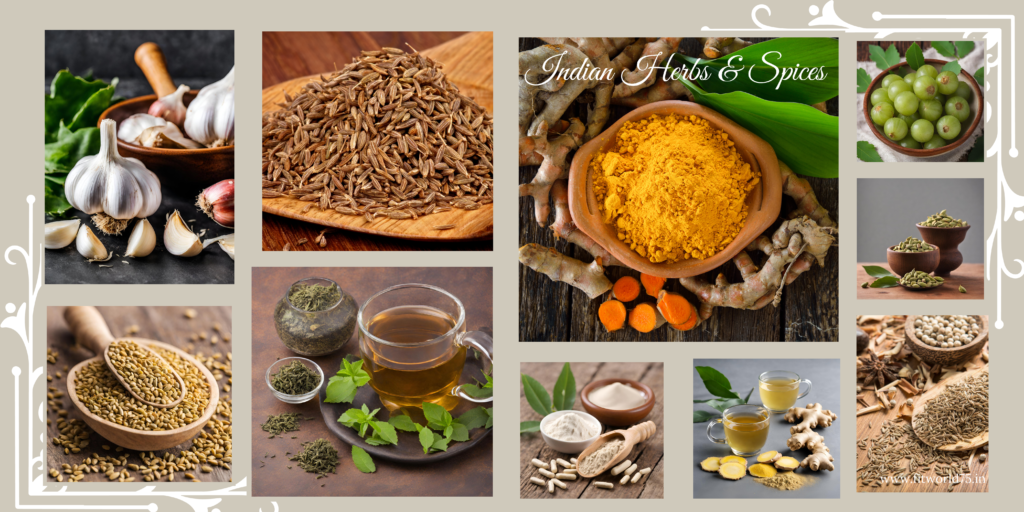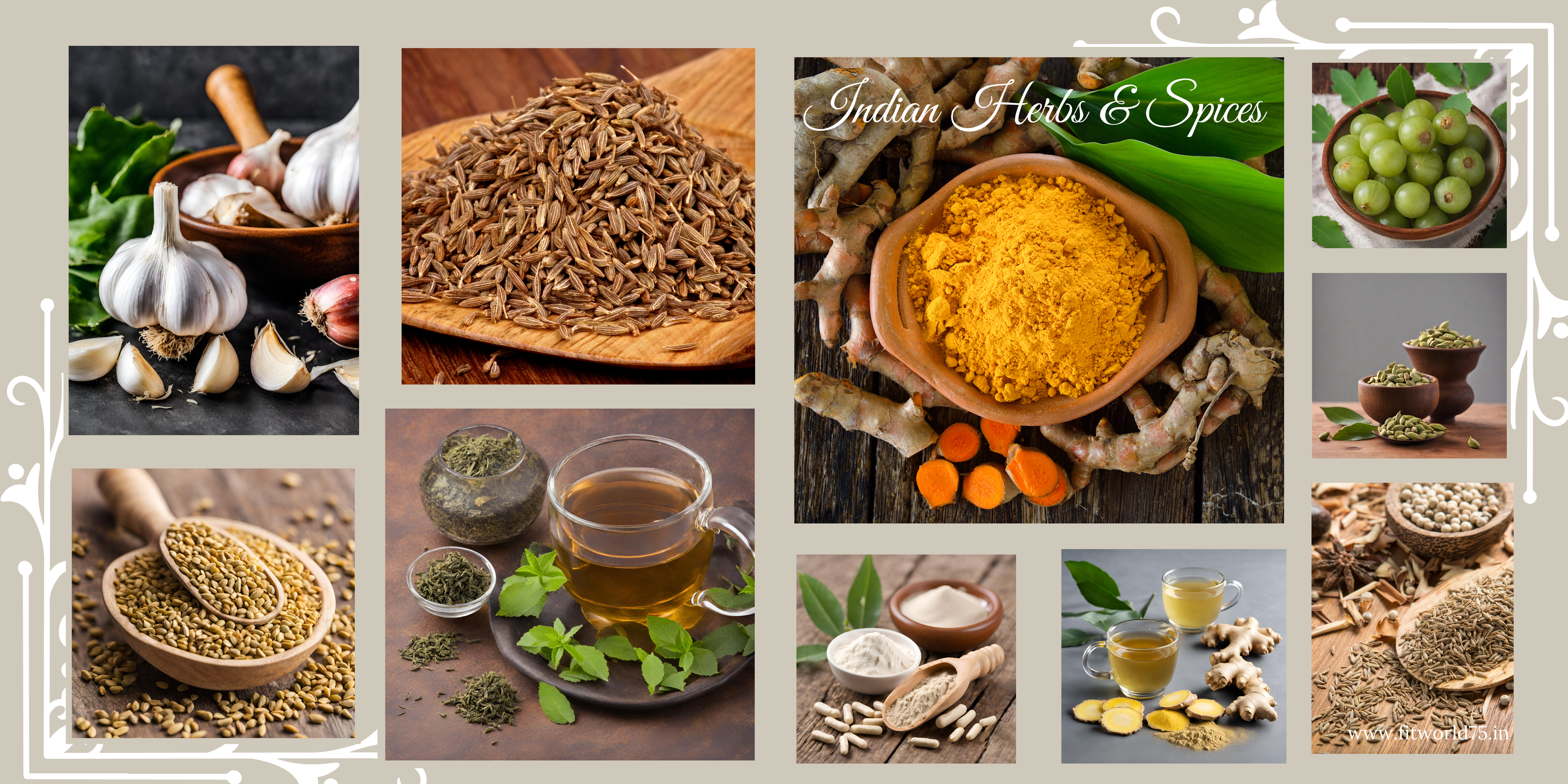Introduction
Immunity becomes a cherished asset in the chilly embrace of Winter 2024, serving as a protector of health against the freezing winds and hiding diseases that are characteristic of the winter season. In order to strengthen our safeguards, we have turned to the ancient knowledge of Indian herbs and spices, which in turn has led us to discover their hidden armory of natural cures. These extraordinary botanical riches have the ability to strengthen our immune systems, therefore preventing the onset of winter-related illnesses.
Table of Contents
Turmeric: The Golden Spice
In the course of our exploration of this magical adventure, we come face-to-face with Turmeric, our first protagonist. One of the polyphenols that has powerful immune-enhancing qualities is curcumin, which is found in this golden spice. Curcumin not only reduces inflammation, but it also encourages the formation of immune cells, which strengthens the immune system. Incorporate its dazzling tint into your meals and allow it to shine a light on your immune system.
Tulsi (Holy Basil): The Sacred Herb
Our second protector is tulsi, which is considered to be the most holy herb in India. In addition to providing relief from stress, the leaves of this plant contain a wealth of antioxidants and adaptogens, which work together to strengthen resilience. Tulsi is revered in Ayurvedic medicine because of the role it plays in strengthening the immune system. A straightforward cup of Tulsi tea may serve as a daily ritual that strengthens your defences.
Ashwagandha: The Stress Reliever
The adaptogen known as Ashwagandha is the most powerful of all adaptogens. In order to resist the effects of stress, which is a quiet underminer of immunity, this botanical miracle is effective. The power of Ashwagandha resides in its capacity to restore equilibrium to the nervous system’s reaction to stimuli, thus enabling your immune system to flourish in a calm environment.
Cinnamon: The Spice of Warmth
While we are making our way through the fragrant maze, cinnamon presents itself as a powerful friend. In addition to its gastronomic appeal, cinnamon has anti-inflammatory qualities that help to maintain a reasonable level of immunological responses. You should make this spice a regular part of your diet so that you may experience the benefits of the warmth it provides to your immune system.
Ginger: Nature’s Healer
Due to the pungent and spicy qualities that it has, ginger is the star of the show. In addition to being the component that gives ginger its characteristic flavour, gingerol also plays an important role in maintaining good health. As a result of its ability to strengthen the immune system and alleviate respiratory pain, it offers comfort throughout the hard winter months.
Garlic: The Flavorful Immunity Enhancer
The component known as allicin, which is found in garlic, is recognised for its ability to strengthen the immune system. Garlic is renowned for its olfactory attractiveness. The significance that garlic plays in strengthening our defences is recognised by both conventional medical practices and contemporary scientific research. Savour the flavour of a healthy you by incorporating it into your culinary creations and embracing it entirely.
Fenugreek: The Seed of Health
The seeds of fenugreek stand out as a revelation among the superheroes that are less well-known. These little seeds are loaded with antioxidants and fibre, making them an excellent source of nourishment. They play a significant part in nourishing the digestive system, which is an essential component of the immune system as a whole.
Amla (Indian Gooseberry): The Vitamin C Powerhouse
Amla, often known as the Indian gooseberry, is an excellent source of vitamin C, which is an essential ingredient for maintaining a healthy immune system. This green fruit with a sour taste is a favourite ingredient in ancient Ayurvedic medicine, and recent studies have shown that it has the ability to strengthen the immune system.
Cardamom: The Exotic Spice
The appeal of cardamom, which is foreign, invites us to come forth. Not only is cardamom a gastronomic delight, but it also has powerful antioxidant properties. Not only can it revitalise foods, but it also has the ability to enhance the natural defences of the body, which protects against the cold of winter.
Cumin: The Digestive Aid
Finally, we come upon cumin, which is recognised as the unsung hero of digestive health. Cumin is a digestive ally that promotes gut health and strengthens the body’s defences due to its ability to strengthen the immune system. A well-functioning gut is essential for immunity.
10 Secret Indian Herbs And Spices To Boost Your Immunity in Winter 2024

Conclusion
During the course of our investigation into these 10 Indian herbs and spices, we have discovered the strongest elixirs that nature has to offer for the winter of 2024. Now that the winter months are drawing near, you may want to think about adding these beauties to your everyday routine. Embrace the season with resiliency and vigor by supporting your immune system with the knowledge that may be gained from both traditional treatments and contemporary scientific research.
Who should not take ashwagandha?
Ashwagandha is an old herb that is used in Ayurvedic medicine. When used in small amounts, it is thought to be safe for most people. But there are some people who should stay away from it or be careful when they use it. Pregnant women, breastfeeding mothers, people with blood pressure issues, stomach ulcers, scheduled surgery, autoimmune diseases, and those on medication for thyroid disease should avoid or consult a doctor before taking it.
What is the benefit of cardamom?
Cardamom is an Indian spice that is used all over the world in food and traditional medicine. It has many health benefits, including: Oral Health, Antioxidant and Diuretic Properties, Digestive Health, Anti-Inflammatory Effects, Cancer Prevention, Anti-Depressant, Liver Health, and Improved Breathing.
Is drinking turmeric every day safe?
Turmeric is safe for most people to drink every day, and its anti-inflammatory and antioxidant qualities can help your health in many ways. But there are some things to think about and possible side effects to be aware of: Bleeding Risk, Gastrointestinal Issues, Gallbladder Problems, Blood Sugar Levels, Hormonal Effects, Pregnancy and Breastfeeding, Surgery and Iron Absorption.
Is Tulsi tea good for you?
The leaves of the holy basil plant (Ocimum sanctum) are used to make tulsi tea. This tea is known to be healing and is used a lot in Ayurvedic medicine. It’s usually a healthy choice for most people because it has a number of health benefits: Stress Reduction, Improved Immune System, Rich in Antioxidants, Anti-Inflammatory Properties, Heart Health, Blood Sugar Control, Respiratory Benefits, Dental and Oral Health, Digestive Health and Skin and Hair health.
What happens if I eat garlic every day?
Garlic is full of nutrients like vitamins, minerals, and antioxidants, so eating it daily can be good for your health in many ways. Here are some of the benefits: Cardiovascular Health, Antibacterial and Antiviral Properties, Antioxidant Effects, Anti-Inflammatory Properties, Detoxification, and Improved Athletic Performance.
Are cumin and jeera the same?
Yes, jeera and cumin are the same thing. The spice that we English speakers call “cumin” is called “jeera” in Hindi. The Cuminum cyminum plant produces cumin seeds, which are used in many dishes around the world, especially in Indian, Middle Eastern, and Latin American cooking.Cumin seeds are used in a lot of different spice mixes and recipes because they have a unique smell and a taste that is earthy and slightly bitter.
What is the common name of cinnamon?
The Indian name for cinnamon is “dalchini”. The common name for cinnamon is simply “cinnamon”. This widely used spice is derived from the inner bark of trees from the genus Cinnamomum.
What is Fenugreek best used for?
Fenugreek, known scientifically as Trigonella foenum-graecum, is a versatile herb with a variety of culinary and medicinal uses: Seasoning, flavoring, and, blood sugar control, lactation aid, digestive aid and cholesterol management.
What are the side effects of amla?
When eaten in small amounts, amla, which is also called Indian gooseberry, is usually thought to be healthy. But, like any natural vitamin, it might have some side effects, especially if too much of it is taken or by certain groups of people. The following are some of the affects and warnings that come with amla: Hypoglycemia, Increased Bleeding Risk, Acidity, Diuretic Effect, Allergic Reactions, Pregnancy and Breastfeeding, Dental Erosion and Interactions with Medications.
What is the Indian name of ginger?
The Indian name for ginger is “Adrak” in Hindi. In different regions of India, ginger may be known by various other local names in the regional languages. For example, it’s called “Ala” in Marathi, “Inji” in Tamil, “Allam” in Telugu, “Adu” in Gujarati, and “Aada” in Bengali. Ginger, or Zingiber officinale, is a widely used spice in Indian cuisine and is also well-regarded in traditional Indian medicine, particularly Ayurveda, for its health benefits.

